Press releases
Maritime affairs

EU Socialist leaders meet to discuss EU elections outcome
28/05/2014
Commissioner Damanaki took part with EU Socialist leaders, to the preparation meeting of the Party of European Socialists (PES) in light of the Informal Dinner of EU Heads of States or Governments. Together, they discussed the outcome of the EU elections and the next steps that will follow in the upcoming months.

Setting down the strategy for the use of EU Structural and Investment Funds
23/05/2014
The Partnership Agreements adopted by the European Commission with Greece and Poland pave the way to growth and competitiveness for both countries. EU investments will tackle unemployment, create good lasting jobs through support to innovation, the low carbon economy and training and education. They will also promote entrepreneurship, fight against social exclusion and make an important contribution to an environmentally friendly and a resource-efficient economy.
For Greece the Partnership Agreement lays the groundwork for the country's transformation into a productive economy with €15.52 billion in total Cohesion Policy funding and €4.2 billion for rural development. These strategic EU investments will boost Greece's efforts to exit the crisis by targeting where the most jobs can be created with maximum impact for the funds.
Commissioner Damanaki commented on the Agreement adopted with reference to Greece:
"The European Maritime and Fisheries Fund is about investing in local coastal communities to help them unlock the development and jobs needed to face the crisis. The great change we have introduced was to increase European funding to small scale fisheries and to the local economy in order to secure a better future of our fishermen and coastal communities. For Greece in particular, the greatest challenge but also the most promising opportunity is to boost the country's Blue Growth potential, taking advantage of its longstanding tradition and experience in marine and maritime sectors: maritime tourism, marine energy, bottom sea exploitation and aquaculture in addition to maritime transport and port development. We will not prescribe how every single cent should be spent. There is flexibility to let the Greek authorities and those who know their craft best - industry and local regions - to work towards a sustainable future for their own communities."
Structural and Investment Funds include the Regional and Development Fund, the European Social Fund, the Cohesion Fund, the Maritime and Fisheries Fund and the Agricultural Fund for Rural Development. Fisheries and Maritime allocations will be finalised this summer.
Partnership Agreements have been adopted until now with Germany and Denmark as well.

Annual meeting of the CHENS in Portsmouth
22/05/2014
The Chiefs of European Navies (CHENS) are holding their annual meeting on May 22 and May 23 in Portsmouth. Commissioner Damanaki is participating in the opening session of the meeting as well as in a panel dedicated to the EU maritime policy.
The CHENS is an informal, independent and non-political forum which brings together the Chief of Navy of each European maritime nation that is either a member of NATO or the EU and has naval armed forces. Together, the members of the CHENS discuss issues of common and mutual interest and seek to increase awareness of the maritime domain in member.
In the framework of the CHENS annual meeting the Commissioner was also invited to an official dinner at the historic HMS Victory.

The annual meeting is the opportunity for Commissioner Damanaki to come back on the proposal that she jointly tabled with High Representative Ashton early March for a European Maritime Security Strategy. Commissioner will also recall that ensuring the security and safety of our seas and oceans is a prime objective for the EU and that this proposal is an important step towards the completion of this objective.
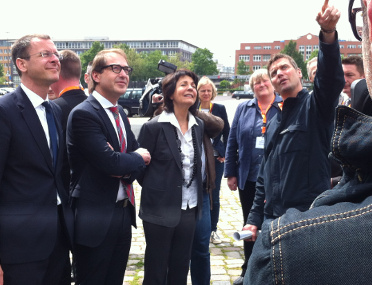
European Maritime Day 2014: Innovating for a sustainable use of our oceans
19/05/2014
Commissioner Damanaki is participating on Monday May 19 in the European Maritime Day organised in Bremen, Germany, in the company of Mr Alexander Dobrindt, German Federal Minister for Transport and Digital Infrastructure and Mr Martin Günthner, Senator of Economic Affairs, Labour and Ports of the Free Hanseatic City of Bremen. Commissioner Damanaki will also be joined during this two-day Conference by Mr Jens Böhrnsen, President of the Senate of the Free Hanseatic City of Bremen as well as by other European ministers.
The theme for this year's conference is "Innovation driving Blue Growth". Innovation and research in the maritime economy can drive a European growth and jobs recovery whilst securing a sustainable future for Europe's seas, oceans, and all those whose livelihoods depend on them. That is the focus of this year's European Maritime Day held in Bremen, Germany, on 19-20 May which will host an exchange of ideas between experts, stakeholders from all maritime sectors and policy makers from across the EU.
Commissioner Damanaki as co-host of the event, stated ahead of this year's European Maritime Day: "Europe's economy is still in choppy waters and we have a duty to maximise every drop of potential to help its recovery. Our seas and oceans have this potential in abundance. We are committed to exploring how best they can help us create jobs and growth – but in a way that does not compromise on our ecosystems. The European Maritime Day is an occasion for the maritime community to discuss how to make sure that growth and sustainability go hand in hand in the blue economy".
The European Commission's Blue Growth agenda seeks to make sustainability the cornerstone for maritime growth, and will therefore be at the heart of the discussions in Bremen. Set against a backdrop of recent announcements by the EU on Blue Innovation, Maritime Spatial Planning, Coastal and Maritime tourism and Ocean energy, the event will bring together each sector of the maritime economy to discuss how they can co-operate, share insights, and make sustainable growth a reality.
More information
Find all details on the conference and the complete programme here. Read and also watch Commissioner's intervention on Blue Innovation during the press conference from May 8, "Blue Innovation: Removing the bottlenecks for sustainable investment in our seas".
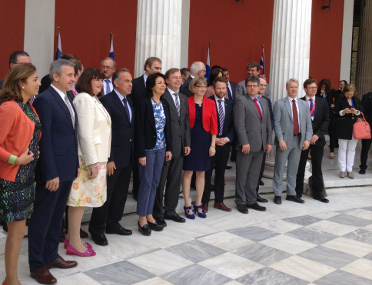
Blue Innovation on the agenda of Athens' Informal Competitiveness Council
13/05/2014
Commissioner Damanaki is participating today in the Informal Competitiveness Council, together with Commissioner Geoghegan-Quinn in Athens and the 28 Ministers in charge. Commissioners Damanaki and Geoghegan-Quinn are presenting the Commission's Communication on Blue innovation, entitled “Innovation in the Blue Economy: Realising the potential of our seas and oceans” adopted last week. Read more about Blue innovation and watch Commissioners Damanaki and Geoghegan-Quinn's joint press conference on May 8 here.
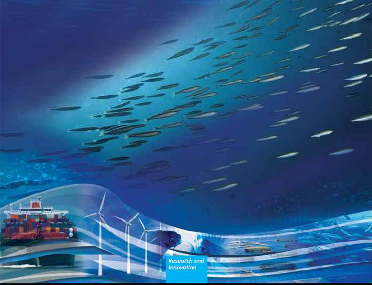
Commission to set out innovation plan for "blue economy" next week
02/05/2014
With land and freshwater resources under pressure, and oceans covering more than two thirds of our planet, we will have to rely more and more on the oceans and seas to provide sources for food, medicine and energy. The Commission will therefore present next week an Action Plan for innovation in the "Blue Economy" to help use ocean resources sustainably and drive growth and jobs in Europe. For example, this could contribute to better knowledge of the ocean, better skills to apply new technologies in the marine environment and better coordination of marine research.
The maritime sector already employs 5.4 million people across Europe, working in professions as diverse as shipbuilding, tourism or offshore wind energy. But it could employ 7 million by 2020.
Important EU Research funding exists to help stimulate innovation. Between 2007 and 2013, the European Commission contributed an average of €350 million a year towards marine and maritime research through its seventh Framework Programme. Blue growth is a "focus area" in the new Horizon 2020 programme, with a specific €145 million budget for 2014-2015 alone, and further opportunities across the programme.
Fisheries

Opening of Bluefin tuna fishing season 2014: EU prioritises high control standards
26/05/2014
The European Commission has reiterated its commitment to implementing the international control measures for Bluefin tuna during the 2014 main fishing season. Running from the 26 May to 24 June in the Mediterranean and the Eastern Atlantic, the season sees large vessels, purse seiners, allowed to fish for Bluefin tuna. The short fishing season is part of the recovery plan agreed at international level to bring back the Bluefin tuna stock to sustainable levels.
Commissioner Damanaki said on the opening of the season: "The EU has been working relentlessly to protect Bluefin tuna: we have reduced our fishing fleet, we have tightened controls and we have played a consistently active role within the International Convention for the Conservation of Atlantic Tuna which is responsible for managing this fishery. That helped to bring the Eastern Atlantic Bluefin tuna stock back from the brink of extinction. I am confident that we are on the right path."
This year, Croatia will be a full part of the EU fleet for the first time. Consequently the number of purse seine vessels has increased and the EU quota for 2014 has risen by 5% to 7.939 tonnes. The other Member States actively involved in the Bluefin tuna fishery are Spain, France, Italy, Greece, Portugal, Malta, and Cyprus. The 8 countries share the EU quota, with Spain and France having the largest parts.
To ensure that no overfishing is taking place, a strict control and inspection programme has been put in place. To ensure high control standards, this programme sets concrete control priorities and benchmarks. It involves a significant deployment of inspectors, patrol vessels and aircrafts coordinated by the European Fisheries Control Agency (EFCA) and the Member States concerned.
The European Commission also monitors catches and analyses Vessel Monitoring System data (a satellite based control system) on a constant basis to ensure that all rules, and particularly the individual vessels' quotas, are fully respected.
The Bluefin tuna fishery is regulated by the International Commission for the Conservation of Atlantic Tunas (ICCAT) where the EU and member states are members. The close collaboration with EFCA, Member States and other ICCAT Contracting Parties, means that all necessary measures are being taken to support the stock's recovery plan and its long term sustainability.
In 2006, ICCAT adopted a 15-year recovery plan for Bluefin tuna in the East Atlantic and Mediterranean which has been regularly modified based on stock assessment, control experiences and new technologies.
In 2010 and 2012 substantial measures have been introduced to enforce the sustainable management of the stock. At its last annual meeting in November 2013, complementary measures have been adopted to improve the control of Bluefin tuna caught alive for farming purposes by laying down detailed rules for the application of new technologies.
Read more on Bluefin tuna here and read Commissioner Damanaki's blog here.

Major reform to make the GFCM a modern, competent and effective body for sustainable fisheries
20/05/2014
The European Commission welcomes a key reform completed by the General Fisheries Commission for the Mediterranean (GFCM) at its Annual Session in Rome today, May 20, which sets ambitious objectives for the conservation of fish stocks in the Mediterranean and the Black Sea.
The agreement reached is in line with the new EU Common Fisheries Policy and provides the organisation the tools to fight illegal, unreported and unregulated (IUU) fisheries and to ensure compliance. The reformed GFCM will establish common standards, rules and will aim at setting a level playing field in the region.
The new Agreement will also strengthen cooperation between GFCM Members for the sustainable management of the stocks they share. It will encourage fishermen to be more involved in the conservation of the resources they live of, and it will allow to better monitor fishing activities in the area.
Commissioner Damanaki, addressed today's GFCM plenary in Rome minutes before the agreement was reached, stressing that this reform will make the GFCM "a more efficient, more credible and more modern organisation; an organisation that is well-equipped and ready to restore the health of marine resources and to take up a leading role in international fisheries management."
Welcoming the agreement reached, the Commissioner stated: “This is a great day for the Mediterranean and the Black Sea and I truly congratulate the General Fisheries Commission for the Mediterranean and FAO for the hard work done to achieve the new Agreement. The EU has contributed greatly to this work and has been working very closely with all its partners in the region. We are fully committed to implement together with our partners this reform as soon as possible. I am convinced that this Agreement will become indispensable for the future of Mediterranean and Black Sea fisheries and fishermen.”
The GFCM is a FAO (United Nations) body whose role is to ensure a good state of stocks in the Mediterranean and the Black Sea. All Mediterranean countries are members of the organization, including the EU. In the Black Sea, Russia, Georgia and Ukraine are observers and participate regularly to the work of the organization.
Read Commissioner Damanaki's speech: "Fisheries management in the Mediterranean and the Black Sea: time to go to the next level".
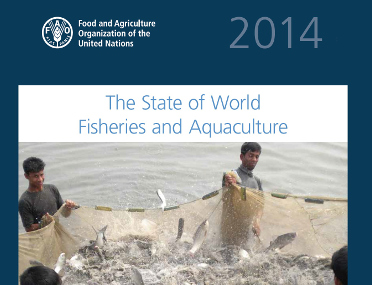
Release of FAO report on the State of World Fisheries and Aquaculture
19/05/2014
The latest edition of the two-year report of the FAO "The State of World Fisheries and Aquaculture ![]() " has been published today. The report underlines that wild fish and farmed fish consumption is increasing all over the world but that sustainability should remain fundamental in the global management of resources.
" has been published today. The report underlines that wild fish and farmed fish consumption is increasing all over the world but that sustainability should remain fundamental in the global management of resources.
The FAO report also indicates that new highs have been set in the fisheries and aquaculture sector over the last two years. Total global capture production of 93.7 million tonnes in 2011 was the second-highest ever. World aquaculture production attained another all-time high of 90.4 million tonnes (live weight equivalent) in 2012, including 66.6 million tonnes of food fish and 23.8 million tonnes of aquatic algae (mostly seaweeds). Farmed food fish contributed a record 42.2 percent of the total 158 million tonnes of fish produced by capture fisheries (including for non-food uses) and aquaculture in 2012.
The EU, through the reform of the Common Fisheries Policy, has reversed the trends of overfishing. In the Atlantic and nearby seas, for example, the proportion of overfished fell from 94% to 39%. EU decided to end the harmful and wasteful practices of discarding fish and prevents illegal, unreported and unregulated fishing products to enter the EU and cooperates closely with partners. However, scientific reports show that most fisheries resources in the Mediterranean and Black Sea are under strong overfishing pressure.
Commissioner Damanaki stated on this occasion: "Sustainability is the core principle of our new European Common Fisheries Policy. Since five years now we have been rebuilding our wild-fish stocks: from 5 stocks fished at sustainable level in 2009 we have now moved to 27 sustainable stocks in 2014. Also, our new guidelines on European aquaculture provide support to the expansion of the sector in order to tackle overfishing and protect wild fish stocks by offering a sustainable solution. A pre-condition for food security across the globe is the sustainability of the stocks and therefore, it is important that FAO continues to work on sustainable management of resources."

Meeting between the College of Commissioners and the Government of the Republic of Moldova
15/05/2014
Today, the European Commission has welcomed the Government of the Republic of Moldova, led by Prime Minister Leancă, in Brussels. The meeting took stock of the latest developments in the Republic of Moldova, addressed both sides’ preparations to ensure that the future EU-Moldova Association Agreement delivers growth and stability up to its full potential, and reviewed the state of play with key reforms in Moldova’s justice sector, business environment and energy relations.

Discussions on the promotion of the sustainability agenda with US Ambassador Luzzatto Gardner
15/05/2014
Commissioner Damanaki met today for the first time with H.E Mr Anthony Luzzatto Gardner, recently sworn in US Ambassador. Together they discussed the importance of the sustainability agenda as well as cooperation between the EU and the US about fisheries and maritime affairs, cooperation within the Regional Fisheries Management Organisations as well as cooperation towards Arctic policy.
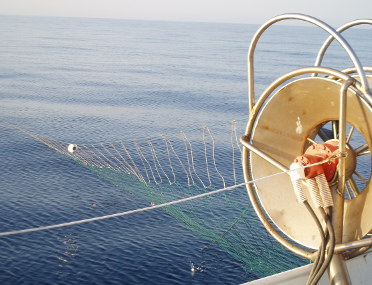
European Commission proposes full ban on driftnets
14/05/2014
The European Commission wants to prohibit the use of any kind of driftnets for fishing in all EU waters as of 1 January 2015. Although rules are already in place to forbid using driftnets to catch certain migratory fishes, the practice continues to be a cause of concern due to the incidental catching of marine mammals, sea turtles and sea birds which are mostly protected under EU legislation. To fight circumvention, the Commission proposal includes a full ban of driftnets fishing in the EU as well as the prohibition of keeping driftnets on board of fishing vessels. Furthermore, to avoid ambiguity, the proposal refines the current definition of a driftnet.
Commissioner Damanaki, said: "Fishing with driftnets destroys marine habitats, endangers marine wildlife and threatens sustainable fisheries. I am convinced that the only way to eradicate this once and for all is to have clear rules which leave no room for interpretation. We need to close any possible loopholes and simplify control and enforcement by national authorities. This will in the end also save the livelihood of those fishermen which have applied the rules over the past years. The ban sends out a clear message that we no longer tolerate any irresponsible practices."
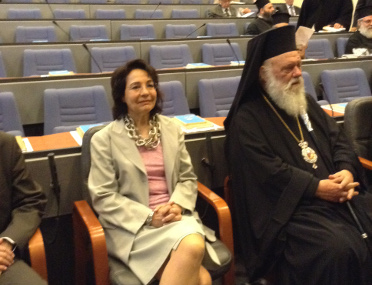
Workshop of the Holy Synod of the Church of Greece on social dimension of EU policies
12/05/2014
Commissioner Damanaki was invited to discuss the social dimension of European policies on May 12 at the Workshop entitled "Solidarity, the social work of the Church and the social dimension of EU policies" in the presence of Archbishop Ieronymos II of Athens. This Workshop was organised in Athens by the Holy Synod of the Greek Church under the auspices of the Greek Presidency of the European Council.
On this occasion, Commissioner Damanaki highlighted that the unprecedented economic crisis that EU is experiencing, is a complex and multilevel crisis beyond its economic dimension and that spocial mechanisms are deeply needed to counter the effects of the crisis. Based on her experience as European Commissioner, Commissioner Damanaki also recalled initiatives to reinforce solidarity, such as for example the Initiative on Youth Employment to tackle the growing youth unemployment all accross Europe, and underlined the importance to protect European values.

Sustainability through gastronomy - 1st Conference on Aegean Gastronomy
12/05/2014
Commissioner Damanaki attended on May 11 the 1st edition of the Conference on Aegean Gastronomy organised in the framework of the Days of the Gastronomy in Athens. The objective of this Conference is the promotion of the Aegean region as a culinary destination. Commissioner Damanaki met during this event with stakeholders such as local organisations, local producers, businesses but also chefs and citizens.
As part of tourism, gastronomy is a useful tool for economic development: it can attract visitors and develop local tourism in a region, therefore increasing employment. And fish is an important traditional component of the Aegean cuisine and the region is rich of local recipes. However, with the fish stocks of the Mediterranean being at threat and overfished, it is important to diversify the fish eaten in the region in order to protect the stocks at risk. For this purpose, information and labelling are essential aspects in this process to allow consumers to make sustainable food choice.
Because sustainability also goes through gastronomy, numerous chefs are involved in promoting the use of sustainable seafood and fish products in their gastronomy. Reknowned Chefs are active in the Inseparable campaign and pledge for sustainable fish tasting.
Maritime affairs and fisheries

Meeting with Ms Catherine Novelli, US Under Secretary for Economic growth, Energy and the Environment
09/05/2014
Commissioner Damanaki met on May 8th for the first time with Ms Catherine Novelli, US Undersecretary for Economic growth, Energy and the Environment. Together they discussed a wide range of issues of mutual interest, from the reform of the international dimension of the Common Fisheries Policy, to the Arctic policy and global ocean governance. Commissioner Damanaki also had the opportunity to exchange views with Under Secretary Novelli on blue growth and blue economy.
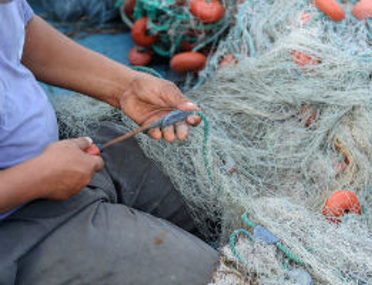
Commission welcomes Council's backing of EMFF
06/05/2014
The Council has backed today the European Maritime and Fisheries Fund (EMFF). The EMFF will help implement the reformed Common Fisheries Policy (CFP) and provide financial support to fishermen, fish farmers and coastal communities to adapt to the changed rules. The Fund will also finance projects to boost 'blue' growth and jobs under the EU's Integrated Maritime Policy (IMP).
This endorsement of the EMFF comes at a right time when the European Commission has adopted yesterday the first of the 28 "Partnership Agreements" that set the strategies in EU Member states and regions for European Structural and Investment Funds, including the EMFF. The first agreement of its kind was signed on May 5th with Denmark and will pave the way for funding of structural policy. Now that the Council has also backed the EMMF, the allocation under Fisheries and Maritime policy will be finalised and published this summer.
On the signature of this first "Partnership Agreement" Commissioner Damanaki stated: "As with all of the other funds, the European Maritime and Fisheries Fund is about investing in local communities to help them unlock the sort of growth and jobs which Europe needs and which the EU is committed to making a reality. We will not prescribe how every single cent should be spent; it is about letting those who know their craft, industry, and local regions best to work towards a sustainable future for their own communities – this is indeed the spirit of the new Common Fisheries Policy."
Find more information on the European Maritime and Fisheires Fund as well as on the first Partnership Agreement on using EU Structural and Investment Funds for growth and jobs in 2014-2020. Find also Q&As on Partnership Agreements.


